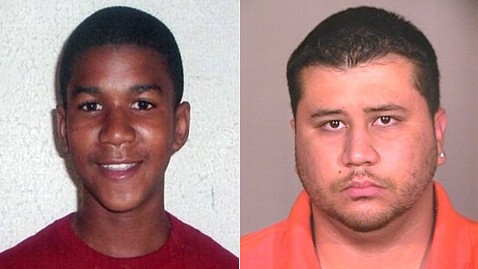Trayvon Martin Case: Timeline of Events

(Image Credit: ABC News; Orange County Jail)
The slaying of 17-year-old Trayvon Martin, a Florida high school student who was shot and killed by George Zimmerman, a self-appointed neighborhood watch captain, has captured national attention.
Petitions calling for justice for Martin have exploded, amid allegations of racism and calls for more scrutiny into how local police handled the investigation. George Zimmerman has yet to be charged in the case.
Below is a timeline of events:
Feb. 26: Trayvon Martin, a 17-year-old Florida high school student, is found shot and killed, in Sanford, Fla., a community north of Orlando.
Several eyewitnesses report to police that they heard a scuffle, then a cry for help, and then a gunshot.
According to the Sanford police report, George Zimmerman, 28, a self-appointed neighborhood watch captain, is found armed with a handgun, standing over Martin. He has a bloody nose and a wound in the back of his head.
Martin is unresponsive and pronounced dead at the scene. He has no weapons on him, only a pack of Skittles and a bottle of iced tea.
Zimmerman tells police he killed Martin in self defense. Taking him at his word, police do not arrest him, nor administer a drug or alcohol test. They also did not run a background check.
March 9: Trayvon Martin’s family demands that police release the 911 tapes or make an arrest nearly one month after Martin was killed. Police declined to comment at the time, but told ABC News the tapes would be released the following week.
March 12: ABC News uncovers questionable police conduct in the investigation of the fatal shooting of Martin, including the alleged “correction” of at least one eyewitness’ account.
Sanford Police Chief Billy Lee said there is no evidence to dispute Zimmerman’s assertion that he shot Martin out of self-defense.
March 16: Police recordings made the night Zimmerman allegedly shot and killed Martin sent the boy’s mother screaming from the room and prompted his father to declare, “He killed my son,” a family representative tells ABC News.
ABC News affiliate WFTV publishes excerpts from the 911 calls.
One of several petitions for Zimmerman’s arrest has garnered more than 250,000 signatures on a change.org site, and at one point signatures were pouring in at the rate of 10,000 an hour, according to the website.
March 18: Martin’s family asks Attorney General Eric Holder and the FBI to get involved in the investigation of their son’s death.
March 19: A 16-year-old girl tells Benjamin Crump, the Martin family’s attorney, about the last moments of Martin’s life, ABC News is there exclusively. Martin was on the phone with her when George Zimmerman began following him. She recounted that she told Martin to run, then she heard some pushing, then the line went dead.
The U.S. Justice Department announces it has launched an investigation into Martin’s slaying.
ABC News also learns that Zimmerman violated major principles of the Neighborhood Watch manual, which states, “it should be emphasized to members that they do not possess police powers, and they shall not carry weapons or pursue vehicles.”
The state attorney in Seminole County, Fla., announces that a grand jury will review the evidence of the case on April 10.
March 20: Sanford police department admits to ABC News that investigators missed a possible racist remark by the shooter as he spoke to police dispatchers moments before the killing.
March 21: During a heated meeting over Trayvon Martin’s death, Sanford city commissioners conducted a vote of “no confidence” against embattled Police Chief Billy Lee. Three of five commissioners voted against the chief.
The city manager now decided whether or not to let Lee go.
Martin’s parents join hundreds of protesters in New York City for the “Million Hoodie March,” demanding justice for the slain 17-year-old.
A single online petition calling for Travyvon’s killer’s arrest has nearly 900,000 signatures and is now the fastest growing petition in internet history, according to Change.org. Tweets from celebrities, such as Justin Bieber and Spike Lee, helped fuel wide interest in the case.
The public relations person for Benjamin Crump, the attorney representing the Martin family, tells ABC News they received 418 media calls in one day.
March 22: City Manager Norton Bonaparte tells ABC News he’ll defer a decision on the chief’s fate until a thorough investigation is completed. Bonaparte acknowledges that the race issue continues to dominate local discourse.
Martin’s family meets officials from the Department of Justice.
Thousands are expected to attend a rally in Sanford, organized by the Reverend Al Sharpton, to demand Zimmerman’s arrest.
Tea-time questions with Scott:
If Trayvon had been white, do you feel there would have been the same amount of outrage?
Do you feel the shooter being non-white makes a difference?
Do you feel social media has played a large part in shaping the public's reaction? How so?
What do you think can be done by law enforcement, the community, and others to prevent future incidents like this one?
 Email
Email
No comments:
Post a Comment